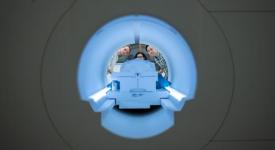Brain Activity Decoder Can Reveal Stories in People’s Minds

05/01/2023 - The work relies in part on a transformer model, similar to the ones that power ChatGPTA new artificial intelligence system called a semantic decoder can translate a person’s brain activity — while listening to a story or silently imagining telling a story — into a continuous stream of text. The system developed by researchers at The University of Texas at Austin might help people who are mentally conscious yet unable to physically speak, such as those debilitated by strokes, to communicate intelligibly again.





